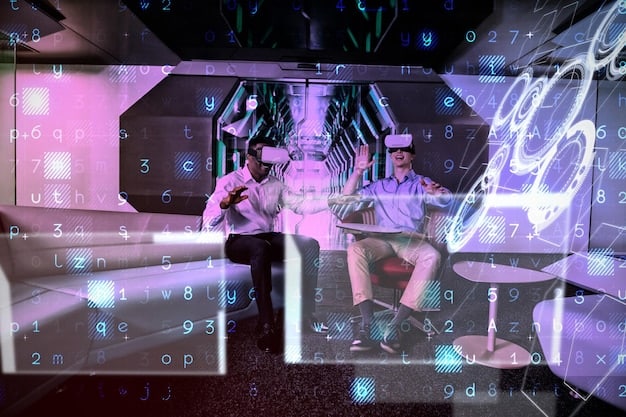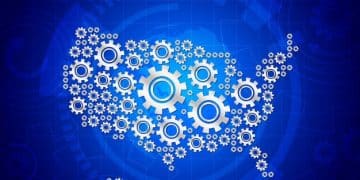The Future of Work: AI’s Impact on US Jobs by 2026

The future of work in US businesses by 2026 will be significantly shaped by AI, automating tasks, enhancing productivity, and creating new job roles, while also requiring workforce adaptation and reskilling initiatives.
The relentless march of technology is reshaping industries, and artificial intelligence (AI) is at the forefront of this transformation. In the US business landscape, the impact of AI on jobs is projected to be profound by 2026. This article explores the future of work: how AI is transforming jobs in US businesses by 2026, exploring the opportunities and challenges that lie ahead.
Understanding the AI Revolution in US Businesses
Artificial intelligence is no longer a futuristic concept; it’s a present-day reality permeating various sectors of US businesses. Understanding the scope and nature of this revolution is crucial for businesses and individuals alike to prepare for the impending changes.
AI’s presence is being felt across various departments, from automating mundane tasks to enhancing decision-making processes. This transformative technology is not just about replacing human workforces but also augmenting their capabilities, improving overall efficiency, and driving innovation.
The Current State of AI Adoption
Currently, AI adoption in US businesses varies depending on the industry and company size. Early adopters, primarily in tech and finance, have already integrated AI into core functions, while others are still in the exploratory phases.
Benefits of AI Implementation
Implementing AI offers a plethora of benefits, including:
- Increased productivity: AI automates repetitive tasks, freeing up human employees for more strategic and creative work.
- Improved accuracy: AI reduces the risk of human error, leading to more reliable results.
- Enhanced decision-making: AI analyzes large datasets to provide valuable insights that aid in making data-driven decisions.
By understanding the current state and potential benefits of AI implementation, businesses can harness its power to achieve significant competitive advantages and drive sustainable growth.
AI-Driven Job Automation: Opportunities and Challenges
Job automation is one of the most talked-about impacts of AI. As AI technologies become more sophisticated, they are capable of performing tasks previously done by humans, creating both opportunities and challenges for US workers.
While job automation can lead to efficiency gains and cost reductions, it’s also essential to consider the potential displacement of workers and the need for reskilling initiatives. Businesses must approach automation strategically to mitigate negative impacts and maximize positive outcomes.
Identifying Jobs at Risk
Certain job roles are more susceptible to automation than others. Data entry clerks, assembly line workers, and customer service representatives are among those most likely to be affected.
Creating New Job Roles
However, AI also creates new job opportunities. The demand for AI specialists, data scientists, machine learning engineers, and AI ethicists is on the rise.
The Need for Reskilling
To successfully navigate the changing job landscape, reskilling and upskilling initiatives are crucial. The government, educational institutions, and businesses must invest in training programs that equip workers with the skills needed to thrive in an AI-driven economy. These programs could include:
- Coding bootcamps
- Data science courses
- AI certifications

By understanding the risks and opportunities of AI-driven job automation, businesses can prepare their workforce for the future and leverage AI to enhance productivity and innovation.
The Evolution of Skills: Adapting to an AI-Enhanced Workplace
As AI takes over routine and repetitive tasks, the skills required in the workplace are evolving. Adaptability, creativity, and critical thinking are becoming increasingly important for US workers to succeed in an AI-enhanced environment.
Beyond technical skills, human skills such as emotional intelligence, communication, and collaboration are also essential. These “soft skills” are difficult for AI to replicate, making them invaluable assets in the modern workplace.
Developing Human Skills
To foster these essential skills, businesses can incorporate:
- Team-building exercises
- Leadership training programs
- Communication workshops
- Cross-functional projects
Embracing Lifelong Learning
Education and training must be designed to foster adaptability and a growth mindset. People need to be willing to learn and adapt throughout their careers.
The Role of Education
Educational institutions play a vital role in preparing students for an AI-enhanced workplace. Curricula must be updated to include:
- AI literacy
- Computational thinking
- Data analysis
By developing human skills, embracing lifelong learning, and updating education curricula, the US workforce can adapt to the challenges and opportunities presented by AI and thrive in an AI-enhanced workplace.
AI in Different Industries: Case Studies
The impact of AI varies across different industries in the US. Examining case studies from various sectors can provide valuable insights into how AI is being implemented and its effects on job roles and business processes.
From healthcare to finance, AI is transforming how businesses operate and deliver value to their customers. Understanding these industry-specific applications is essential for businesses seeking to leverage AI for competitive advantage.

Healthcare
In healthcare, AI is used for:
- Diagnosis
- Drug discovery
- Personalized medicine
Finance
In finance, AI is used for:
- Fraud detection
- Algorithmic trading
- Customer service chatbots
Manufacturing
In manufacturing, AI is used for:
- Predictive maintenance
- Quality control
- Inventory management
By examining case studies in healthcare, finance, and manufacturing, US businesses can gain a deeper understanding of the potential applications and benefits of AI in various sectors, allowing them to make better-informed investment and implementation decisions.
Ethical Considerations and Responsible AI Implementation
As AI becomes more pervasive in US businesses, ethical considerations and responsible implementation are paramount. AI systems must be developed and deployed in a way that ensures fairness, transparency, and accountability.
Biases in AI algorithms can perpetuate and amplify existing societal inequalities. Addressing these biases and ensuring that AI systems are used for good is crucial for maintaining public trust and avoiding unintended consequences.
Addressing Bias in AI Algorithms
To mitigate bias, businesses must:
-
*Ensure diverse datasets.
*Implement bias detection tools.
*Establish ethical standards for AI development.
Ensuring Transparency and Accountability
Transparency and accountability are critical for building trust in AI systems. Businesses must be able to explain how AI systems work and how decisions are made.
Building Public Trust
Building public trust in AI requires a collaborative effort among policymakers, businesses, and the public. Open dialogue and education are essential for addressing concerns and promoting responsible AI implementation.
By addressing ethical considerations and implementing AI responsibly, US businesses can ensure that AI benefits society as a whole and avoids unintended negative consequences.
Preparing for the Future: Strategies for US Businesses
Preparing for the future of work in the age of AI requires US businesses to adopt proactive strategies. From investing in AI technologies to developing reskilling programs, companies must take a holistic approach to ensure they are well-positioned for success.
A strategic vision, coupled with a commitment to innovation and adaptability, can help businesses navigate the challenges and leverage the opportunities presented by AI.
Investing in AI Technologies
Investing in AI technologies is crucial for staying competitive. Businesses should identify areas where AI can drive efficiency, innovation, and customer value.
Developing Reskilling Programs
Reskilling employees is essential for preparing the workforce for AI-driven job roles. Businesses should offer training programs that equip employees with the skills needed to thrive in an AI-enhanced workplace.
Fostering a Culture of Innovation
Fostering a culture of innovation is key to unlocking the full potential of AI. Businesses should encourage experimentation, collaboration, and continuous improvement.
By investing in AI technologies, developing reskilling programs, and fostering a culture of innovation, US businesses can prepare for the future of work and leverage AI to achieve sustainable growth.
| Key Point | Brief Description |
|---|---|
| 🤖 AI Adoption | AI is increasingly integrated into US businesses, enhancing productivity and decision-making. |
| 💼 Job Automation | AI automates tasks, creating both job displacement and new opportunities requiring reskilling. |
| 📚 Skills Evolution | Adaptability, creativity, and human skills are essential in an AI-enhanced workplace. |
| ⚖️ Ethical AI | Responsible AI implementation requires fairness, transparency, and addressing bias in algorithms. |
FAQ
▼
AI is being utilized to automate repetitive tasks, enhance data analysis, improve customer service through chatbots, and optimize various operational processes across industries.
▼
Jobs involving routine and repetitive tasks, such as data entry, certain types of manufacturing work, and some customer service roles, are most susceptible to automation.
▼
New roles are emerging in AI development, data science, machine learning engineering, AI ethics, and related fields, requiring specialized skills and expertise.
▼
Critical skills include adaptability, creativity, problem-solving, emotional intelligence, and the ability to collaborate effectively with AI systems. Technical literacy is also essential.
▼
Businesses can ensure responsible AI implementation by addressing biases in algorithms, ensuring transparency, establishing ethical guidelines, and investing in education and training for employees.
Conclusion
The future of work in US businesses is undeniably intertwined with the advancement of AI. While AI presents both opportunities and challenges, a strategic and ethical approach can help businesses leverage its power to enhance productivity, drive innovation, and improve overall outcomes. Embracing change, investing in reskilling, and addressing ethical considerations are essential for navigating the future of work: how AI is transforming jobs in US businesses by 2026 and beyond.





